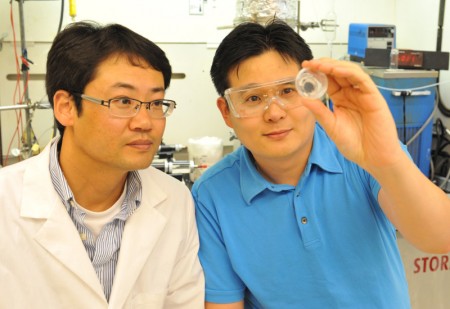Jun
17
A Fuel Cell Directly Fueled With Jet Fuel or Gasoline
June 17, 2014 | 4 Comments
Washington State University (WSU) researchers have developed the first fuel cell that can directly convert jet fuel or gasoline to electricity. If the fuel cell will scale up economically that could take the 30 mpg automobile beyond 100 mpg. Its a dramatically more energy efficient way to create electric power for planes or cars.
A second paper on using their fuel cell with gasoline has now been accepted for publication in the Journal of Power Sources.
Right now the team has built coin-sized fuel cells to prove the concept and plan to scale it up.

Fuel Cell Powered by Jet & Gas at WSU. Graduate Student Byeong Wan Kwon and WSU Associate Professor Su Ha inspect a fuel cell. Image Credit: Washington State University. Click image for the largest view.
This new technology is special in avoiding two particular problems. Using jet fuel and gasoline to power a fuel cell usually requires the added weight of a device that converts the complex fuels into simpler components, such as hydrogen and carbon monoxide into the mixture called synthesis gas. The WSU researchers wanted to be able to directly feed the liquid fuel into the fuel cell. They had to overcome the problems of sulfur poisoning and coking, a process in which a solid product is created from imperfect combustion. Sulfur is present in all fossil-based fuels and can quickly deactivate fuel cells.
Using a unique catalyst material and a novel processing technique, Ha and Norton and collaborators at Kyung Hee University in South Korea and personnel at the Boeing Company in Seattle have produced a high-performance fuel cell that operates when directly fed with the jet fuel surrogate.
Joe Breit, associate technical fellow at Boeing and a participating researcher on the project said, “The results of this research are a key step in the integration of fuel cell technology in aviation and the development of the more electric airplane.”
The professors started about 10 years ago in developing a solid-oxide fuel cell to provide electrical power on commercial airplanes. Fuel cells offer a clean and highly efficient way to convert the chemical energy in fuels into electrical energy. In addition to increasing fuel efficiency and reducing emissions of harmful pollutants, fuel cells are quiet and would be particularly helpful when a plane is at a gate and the main jet engines are turned off.
The WSU researchers envision integrating their fuel cell with a battery to power auxiliary power units. These units are currently powered by gas turbines and operate lights, navigation systems and various other electrical systems. The two technologies complement each other’s weaknesses, says Ha.
The researchers also have already tested using gasoline to power their fuel cell and envision someday using it to power cars. Vehicles powered in this way could use existing gas stations, rather than having to develop a hydrogen-based infrastructure.
The text results reported are impressive, especially in light of a direct fueling. The new fuel cell generated an initial maximum power density 3 W cm−2 at 750 °C and maintained this high initial activity over 24 hours with no coking. The addition of 500 ppm of sulfur into the fuel stream did not deactivate the cell.
This is another solid-oxide fuel cell that’s similar to a battery in that it has an anode, cathode, and electrolyte and creates electricity, except it uses fuel to create a continuous flow of electricity.
The process could be approximately four times more efficient than a combustion engine because it is based on an electrochemical reaction. The solid-oxide fuel cell is different from other fuels cells in that it is made of solid materials, and the electricity is created by oxygen ions traveling through the fuel cell.
The issues remain in getting the fuel cell hot and keeping it hot while feeding it the fuel stream safely.
There is a lab unit working, so this could be very disruptive technology.
Comments
4 Comments so far


Congrats to Byeong Wan Kwon and WSU Associate Professor Su Ha inspect a fuel cell. And yes, it’s true that this new technology is specially avoiding many problems, but when that technology comes to I think maybe in two years.
………………………
gas to gasoline
yes, it’s true that this new technology is specially avoiding many problems, but when that technology comes to I think maybe in two years.
Congrats to Byeong Wan Kwon and WSU Associate Professor Su Ha inspect a fuel cell. And yes, it’s true that this new technology is specially avoiding many problems, but when that technology comes to I think maybe in two years.
They are cheating…..
If you read their paper with basic fuel cell technology, you know the value they got is impossible…